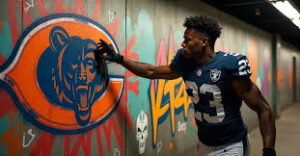Davante Adams Takes a Swipe at the Bears: A Deep Dive into the Rivalry and Its Implications
In the world of professional football, rivalries are the lifeblood that fuels passion among players and fans alike. One such rivalry that has stood the test of time is between the Green Bay Packers and the Chicago Bears. Recently, this age-old feud was reignited when star wide receiver Davante Adams took a swipe at the Bears, stirring conversations across the NFL community.
Understanding the Packers-Bears Rivalry

The Packers-Bears rivalry is one of the oldest and most storied in the NFL, dating back to 1921. Over the decades, these two teams have faced off numerous times, each game adding a new chapter to their contentious history. The rivalry is characterized by fierce competition, memorable moments, and a mutual desire to assert dominance in the NFC North division.
Davante Adams: A Brief Overview
Davante Adams, known for his exceptional route-running and reliable hands, has been a significant figure in the NFL since being drafted by the Green Bay Packers in 2014. Throughout his career, Adams has consistently demonstrated his prowess on the field, earning multiple Pro Bowl selections and All-Pro honors. His contributions have been instrumental in the Packers’ offensive success over the years.
The Incident: Davante Adams Takes a Swipe at the Bears
The phrase “Davante Adams takes a swipe at the Bears” encapsulates a moment where Adams made a pointed comment or gesture towards the Chicago Bears, reflecting the deep-seated rivalry between the two teams. Such instances are not uncommon in the NFL, where players often engage in verbal sparring to assert their team’s superiority and psyche out opponents.
The Context Behind the Swipe
To fully grasp the significance of Adams’ comment, it’s essential to consider the context in which it was made. Whether it was during a press conference, a social media post, or an on-field celebration, such actions are often strategic, aimed at rallying teammates and fans while also getting under the skin of rivals. In the case of Adams, his swipe at the Bears likely served to reinforce the Packers’ dominance in the rivalry and boost team morale.
Reactions from the NFL Community

Adams’ comment did not go unnoticed. Fans, analysts, and fellow players weighed in, with reactions ranging from amusement to criticism. Some viewed it as a harmless expression of competitive spirit, while others saw it as unnecessary provocation. Regardless of the perspective, the incident added fuel to the already intense Packers-Bears rivalry.
The Impact on Team Dynamics
When a prominent player like Davante Adams takes a swipe at a rival team, it can have various effects on team dynamics. For the Packers, it might serve as a unifying force, galvanizing players around a common adversary. Conversely, it could also place added pressure on the team to perform and back up the bold statements made by their star player.
Media Coverage and Public Perception
The media plays a significant role in amplifying such incidents. Headlines like “Davante Adams takes a swipe at the Bears” capture attention and spark debates among fans and analysts. Public perception can be influenced by how the media portrays the incident, potentially affecting a player’s reputation and the team’s image.
Historical Precedents of Player Rivalries
Adams’ actions are part of a long tradition of players engaging in rivalries through words and gestures. From trash-talking to celebratory dances, such behaviors are ingrained in the culture of professional sports. They serve to heighten the drama and excitement surrounding games, especially when long-standing rivalries are involved.
The Psychological Aspect of Rivalries
Engaging in rivalries can have psychological implications for players. For some, it serves as motivation to perform at their best, while for others, it can become a distraction. Understanding the mental dynamics at play can provide deeper insights into why players like Davante Adams might choose to take a swipe at a rival team.
Fan Engagement and Merchandise Sales

Incidents like Adams’ comment can also influence fan engagement and merchandise sales. Fans often rally behind bold statements made by their favorite players, leading to increased support and enthusiasm. Merchandise featuring slogans or imagery related to the rivalry can see a surge in sales, benefiting the team’s revenue.
The Role of Social Media
In today’s digital age, social media platforms amplify players’ voices and actions. A single comment or post can go viral, reaching a vast audience and eliciting immediate reactions. For players like Davante Adams, this means that any swipe at a rival team is likely to gain significant attention, for better or worse.
Coaching Strategies in Rivalry Games
Coaches often develop specific strategies for rivalry games, recognizing the heightened emotions and stakes involved. They may use incidents like Adams’ comment to motivate players or to instill a sense of urgency and focus. Understanding the coaching perspective can shed light on how such incidents are managed within the team.
The Business Side of Rivalries
Rivalries are not just about competition; they also have business implications. Games between rival teams often draw higher viewership, leading to increased advertising revenue and sponsorship opportunities. Incidents that stoke the rivalry, like Adams’ swipe at the Bears, can thus have financial benefits for the league and the teams involved.
The Ethical Considerations
While rivalries add excitement to sports, they also raise ethical questions. Where is the line between competitive banter and unsportsmanlike conduct? Players and teams must navigate these boundaries carefully to maintain the integrity of the game while engaging in spirited competition.
The Influence on Younger Athletes
Professional athletes serve as role models for aspiring players. When a star like Davante Adams takes a swipe at a rival team, it can influence how younger athletes perceive and engage in competition. It’s essential to consider the messages being sent and the behaviors being modeled for the next generation.
The Long-Term Effects on Player Legacy
Incidents involving rivalries can become defining moments in a player’s career. For Adams, his swipe at the Bears might be remembered as a bold expression of team loyalty or as a controversial moment, depending on future outcomes. Such events contribute to the narrative that shapes a player’s legacy.
The Legal and Contractual Implications
While rare, certain actions or comments made by players can have legal or contractual consequences. Teams and leagues have codes of conduct that players are expected to follow. Understanding these frameworks can provide insight into the potential repercussions of incidents like Adams’ comment.
The Role of Team Leadership
Team leaders, including captains and veteran players, often play a role in managing the fallout from rivalry-related incidents. They may mediate discussions, address the media, or work to maintain team cohesion. Their leadership is crucial in navigating the complexities that arise from such situations.
The Cultural Significance of Rivalries

Rivalries like Packers vs. Bears are deeply embedded in the cultural fabric of sports. They transcend the game itself, influencing regional identities and community pride. Incidents that intensify these rivalries, such as Adams’ swipe at the Bears, resonate beyond the field, impacting fans and communities.
The Evolution of Player-Fan Interactions
In the modern era, players have more direct interactions with fans through social media and public appearances. This increased accessibility means that actions like Adams’ comment can lead to immediate and widespread fan reactions, both supportive and critical. Understanding this dynamic is essential in analyzing the incident’s impact.
The Importance of Media Training for Athletes
Given the potential ramifications of public comments, media training is vital for professional athletes. Such training equips players with the skills to navigate interviews and public statements effectively, helping them to convey their messages while minimizing unintended consequences.
The Psychological Warfare in Sports
Taking a swipe at a rival team can be seen as a form of psychological warfare, aiming to unsettle opponents and gain a mental edge. This tactic, while risky, is employed by players seeking to assert dominance and influence the game’s psychological landscape.
The Role of Team Public Relations
Team PR departments play a crucial role in managing the narrative following incidents like Adams’ comment. They craft statements, coordinate media interactions, and work to protect the team’s image while addressing any controversies that arise.
The Fan Perspective
From the fans’ viewpoint, such incidents can be polarizing. Supporters of the player’s team may view the comment as a display of passion and loyalty, while rival fans may perceive it as disrespectful. These differing perspectives contribute to the vibrant discourse that surrounds professional sports.












Post Comment